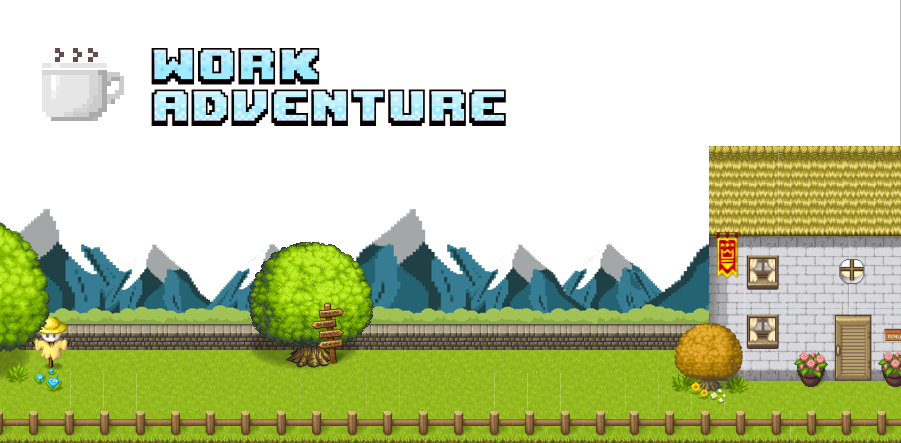|
|
||
|---|---|---|
| .github/workflows | ||
| .husky | ||
| back | ||
| benchmark | ||
| contrib/docker | ||
| docs | ||
| front | ||
| maps | ||
| messages | ||
| pusher | ||
| uploader | ||
| .dockerignore | ||
| .env.template | ||
| .gitignore | ||
| CHANGELOG.md | ||
| CONTRIBUTING.md | ||
| deeployer.libsonnet | ||
| docker-compose.single-domain.yaml | ||
| docker-compose.yaml | ||
| package.json | ||
| README-INTRO.jpg | ||
| README.md | ||
| SECURITY.md | ||
| Vagrantfile.template | ||
| yarn.lock | ||
Demo here : https://workadventu.re/.
Work Adventure
Work Adventure is a web-based collaborative workspace for small to medium teams (2-100 people) presented in the form of a 16-bit video game.
In Work Adventure, you can move around your office and talk to your colleagues (using a video-chat feature that is triggered when you move next to a colleague).
Setting up a development environment
Install Docker.
Run:
docker-compose up -d
The environment will start.
You should now be able to browse to http://play.workadventure.localhost/ and see the application. You can view the dashboard at http://workadventure.localhost:8080/
Note: on some OSes, you will need to add this line to your /etc/hosts file:
/etc/hosts
127.0.0.1 workadventure.localhost
MacOS developers, your environment with Vagrant
If you are using MacOS, you can increase Docker performance using Vagrant. If you want more explanations, you can read this medium article.
Prerequisites
- VirtualBox* 5.x Latest version https://www.virtualbox.org/wiki/Downloads
- Vagrant 2.2.7 Latest version https://www.vagrantup.com/downloads.html
First steps
Create a config file Vagrantfile from Vagrantfile.template
cp Vagrantfile.template Vagrantfile
In Vagrantfile, update VM_HOST_PATH with the local project path of your machine.
#VM_HOST_PATH# => your local machine path to the project
(run pwd and copy the path in this variable)
To start your VM Vagrant, run:
Vagrant up
To connect to your VM, run:
Vagrant ssh
To start project environment, run
docker-compose up
You environment runs in you VM Vagrant. When you want stop your VM, you can run:
Vagrant halt
If you want to destroy, you can run
Vagrant destroy
Available commands
Vagrant up: start your VM Vagrant.Vagrant reload: reload your VM Vagrant when you change Vagrantfile.Vagrant ssh: connect on your VM Vagrant.Vagrant halt: stop your VM Vagrant.Vagrant destroy: delete your VM Vagrant.
Setting up a production environment
The way you set up your production environment will highly depend on your servers.
We provide a production ready docker-compose file that you can use as a good starting point in the contrib/docker directory.

